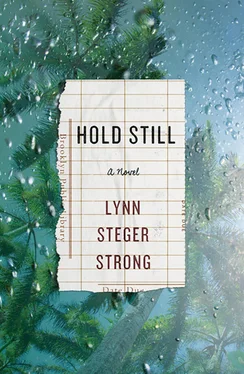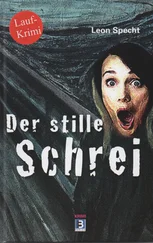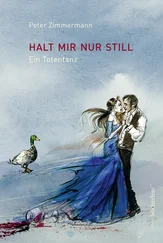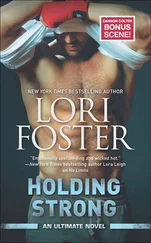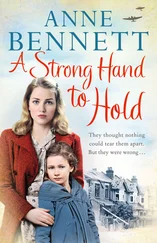“This is not a vocabulary thing.”
“It is exactly. Since when do you care about a game?”
He waited, and she knew the answer before she’d even asked the question. He always had. She rolled her window down and rested her hand along the outside of the car.
She’d done nothing. She’d drunk more gin than she’d intended. She’d been asked about her specialty and had gone on a bit too long about Virginia Woolf and death.
She kept her eyes fixed on the trees along the West Side Highway, the stretch of cobbled concrete, and then the water just beyond. She wished that she were running. That she were all alone, feet pounding, and Stephen were safe and quiet in their bed. Her voice got quieter as she spoke. “I was explaining what I do,” she said.
He’d called it proselytizing. “You were freaking people out.”
“They’re academics Stephen. They don’t freak out that easily.”
“You were too drunk to see.”
“I wasn’t drunk.” She hardly ever drank and could not hold her liquor. Probably she had been a little drunk. “Would you rather I just talk about the children?” El was ten, Ben was eight.
He turned to her again. “Would that have been so hard?”
It would have been. Even when she wanted to just sit and gush about her children, take out pictures, tell stories of all the ways in which they astounded her each day, she was too terrified of losing hold of all she was outside of them. She was adamant in her need to be someone separate from their mom.
The car turned down into the tunnel. The smell of exhaust hit Maya, then the bright lights on either side. She rolled her window up.
It had been awkward. She’d tried at first. A man she’d never met had asked her what she did. He was condescending, the way he kept looking past her for some other, better conversation, feeling stuck, perhaps, sitting next to this small woman whom he did not know or care to get to know. She always felt slightly, in some specific but noticeable way, as if she were awkwardly dressed. This night it had been the shoes she was wearing, high-heeled and open-toed, shoes she aspired to wear with confidence and then was not quite able to walk in comfortably. They were garish, she saw as soon as they’d made it uptown, not quite right, and she was forced to spend the night seated, her feet tucked beneath her chair, leaning forward with her elbows resting on the table, wishing she were — like every other woman in the room — wearing flats.
“Woolf,” she’d said in response to the man’s question. Clipped and inappropriate. But she was gauging him, testing — Stephen hated when she did this; why, he asked her, could she not just be pleasant and smile and nod — she was interested in how he would respond. Would he think Thomas or Tom or Tobias, would he know immediately, because of her demeanor or the way she pulled tight on her shawl, that she meant the tragic female character, the one who’d chosen water over life? He was the husband of one of Stephen’s colleagues, a mathematical philosopher, empiricism. If pushed, Stephen would have had to admit he didn’t like the wife any more than Maya liked this man. He traded futures. Maya’d loved the sound of this, the idea of such a phrase. But it had been much less interesting than it sounded as he’d explained. And there was, then, the third glass of gin and lime.
“Virginia,” she said when he stayed silent. “The presence of the absence.” He looked at her as if she were speaking some language unknown to anyone but her. “Death,” she said. “I look at how she has used it in her work to explore both the experience and effects of death, the particular way in which it’s always present, entering the room, overtaking life, dissipating, sliced like a knife through everything .” She stopped to sip her drink again. “Death as communication when all other forms have failed.” He squirmed and cupped the base of his drink with meaty fingers. He shook his glass and tipped it, then sucked slowly on a piece of ice.
“I also teach,” she said.
“And the kids get that? They can make sense of all of that?” He had a fleshy face, and a burst blood vessel had left a splotch of red below his eye.
“Some of it,” she said. “They’re very bright, the kids I get. They’re wonderful.” She believed this as she said it, smiled thinking of them. “I teach intro classes also. It’s a pretty universal concern, though, right?”
He nodded. “It’s not really practical, though, huh? It certainly won’t help them get jobs.”
Maya sat up straighter and pulled her shawl more tightly to her chest. “Practical,” she said. “It’s literature.”
She’d meant this as corrective. But he stared at her smugly, as if she’d just proven him right.
“This is the problem with liberal education,” he said. “These kids are paying hundreds of thousands of dollars to leave school without a single marketable skill.”
“Do you consider knowing how to think impractical?” she asked him. Her voice had risen. She was somehow, inexplicably, standing up. The shoes and then the gin: she was unsteady on her feet.
“I happen to think quite well,” he said.
“You’re a fucking idiot,” Maya’d said.
She might have raised her voice.
People were watching. She could feel Stephen’s eyes.
He pulled her away.
“You were about three seconds from throwing your drink.”
“He was an ass, Stephen.”
“Did you think you might convert him if you yelled more?”
“I wasn’t yelling.” Maya placed her now-bare feet back on the floor. Stephen glared at her. They’d just come through the tunnel. She looked ahead to avoid facing him. She watched the light turn to yellow and then red.
“Stephen!” she said. But they were halfway through the intersection by the time the brakes caught. Horns honked. Maya fell forward and her head hit hard on the dash.
“I did in vitro,” says Annie. She talks freely, ambling from topic to topic, not seeming to mind when or if Ellie or Jeffrey joins.
They’ve been swimming — after fifteen minutes in the car, Ellie staring down at her hands, nervous, Annie chatting, Jeffrey smiling, trekking over the boardwalk, Ellie barefoot on tiptoes forgetting how very hot the sand could get, finally then forgetting Jack and Jeff and Annie all behind her, diving in and thinking, perfect —those few minutes she was underwater like there might be no one in the world but her.
“It took us two years before it worked,” Annie says.
All three of them have showered. Ellie put her clothes away while Jeffrey and Annie fed Jack and put him to bed. She tried on a dress and two pairs of shorts, before she chose a loose-fitting pair of jeans and one of Ben’s old soccer shirts. They usually all eat together, Annie told her, but all the hours in the water have worn Jack’s tiny body out.
“I never thought I wanted a family, you know?” She moves from the pantry to the stove and pours a cup of rice into boiling water; she grabs the cutting board from Ellie and scrapes the garlic and the onions into a pan. “I always felt so independent,” she says. “But then, I was almost forty and desperate for someone to love like that.” Ellie’s still a minute, trying to figure out what “like that” means, but Annie doesn’t explain and Ellie doesn’t ask her. Annie takes the strips of peppers Ellie’s cut and drops them in the pan. “Jeffrey.” She nods toward him. He wears shorts and a short-sleeved white button-up. He holds his hair behind one ear and smiles at his wife. “I thought he would be ambivalent. We’d talked about it, you know? But it seemed like we’d decided by virtue of waiting as long as we did. He has his kids, you know, his patients. He gives so much to his work. But once we started trying, he was more attached to the idea than me.”
Читать дальше
